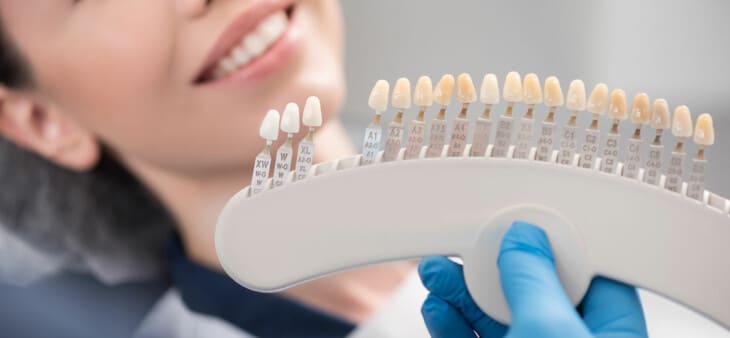
Dental veneers are a popular cosmetic treatment that can improve your smile’s appearance. Veneers can correct many cosmetic dental concerns, such as gapped and stained teeth. However, they are unsuitable for repairing cracked or fractured teeth or teeth with deep decay because they do not repair damage.
If you want to enhance your smile with veneers, arrange a consultation with your dentist. They can perform a thorough dental exam to determine whether you are a candidate and discuss your smile goals and treatment options.
What Are Dental Veneers?
Dental veneers are composite or porcelain shells that are color-matched and custom-made to cover the tooth’s front surface. They are an option for people with chipped, stained, or short teeth and teeth with small gaps between them. Veneers are also used to change the shape and color of your teeth.
In many cases, people choose to get veneers on their front six to eight teeth because they are typically the only teeth that are visible when you talk or smile.
What Makes Someone a Candidate for Dental Veneers?
Veneers are ideal for improving the contour and color of your teeth; however, some conditions may preclude you from receiving veneers. To ensure that dental veneers are right for your smile, you should meet the following criteria:
Have Sufficient Tooth Enamel
Tooth enamel is the hard, outermost layer of your teeth that helps protect them from damage. To place dental veneers, a small amount of tooth enamel must be removed (approximately .5mm).
If your tooth enamel is already thin or damaged due to acid erosion, you may not be a good candidate for this procedure. However, if you have healthy tooth enamel, your dentist will have enough space to apply the dental adhesive and the custom shell to ensure the veneer sits flush with your natural teeth.
Do Not Have Bruxism
Teeth grinding places undue stress on your teeth, often up to 250 pounds of force per square inch. This intense bite force can chip or crack the veneer or loosen the cement keeping the shell on your tooth, leading to frequent repairs.
If you have bruxism, consult your dentist about being fitted for a night guard to protect your teeth and veneers, or consider an alternative treatment to rejuvenate your smile.
To prolong the life of your dental veneers, avoid chewing or biting hard foods like nuts, candy, or ice and using your teeth to open packages or chew on non-food objects like pens.
Be Committed to Good Oral Health
Before you get veneers, be aware of the commitment required to maintain healthy teeth and gums. You’ll need to take extra care of your teeth, brushing and flossing diligently daily.
You may need to modify your flossing technique to avoid snapping the floss upward against the veneer shell because this can dislodge the veneer. If you prefer, you can use a Waterpik, which uses a gentle jet of water to remove debris from between your teeth.
Contact Us Today for a Consultation
At Aurora Dental Group, we are committed to providing our patients with the highest quality dental care. If you have any questions about our services or would like to schedule an appointment, contact us today at (630) 896-7354.
